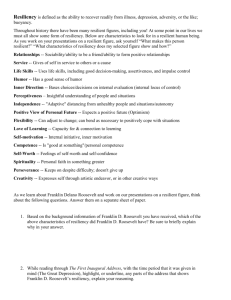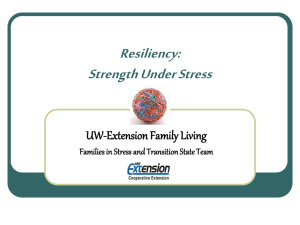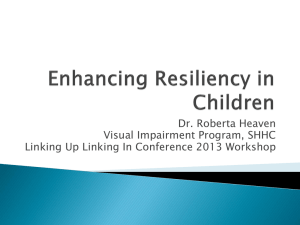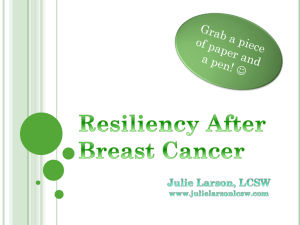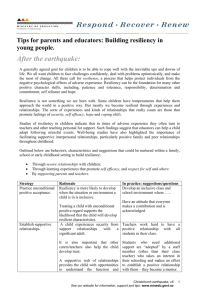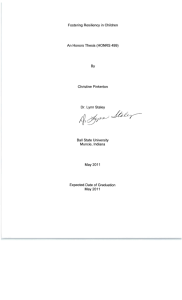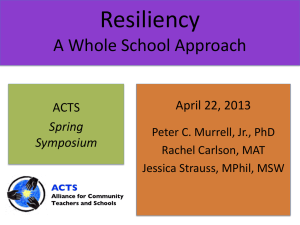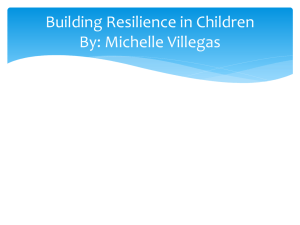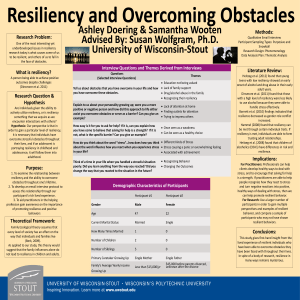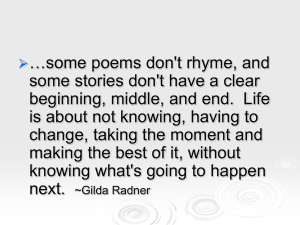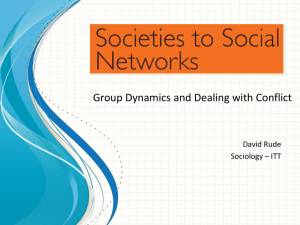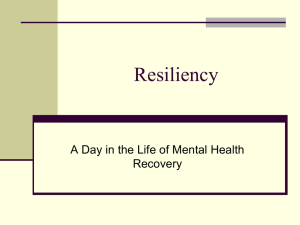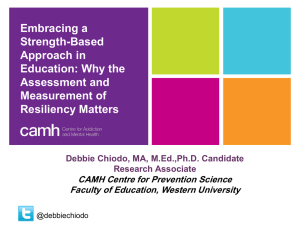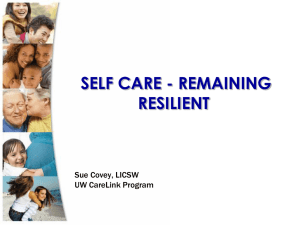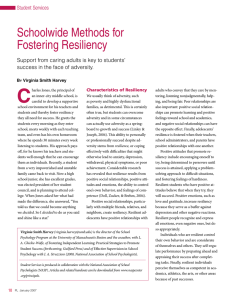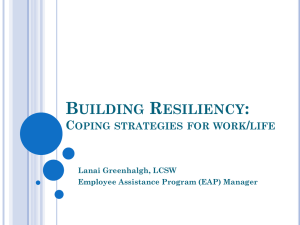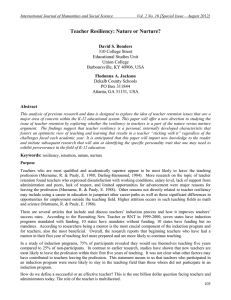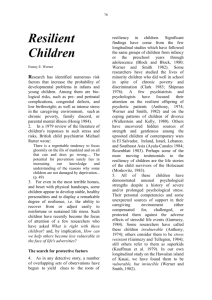Cognitive Restructuring and mental resiliance
advertisement
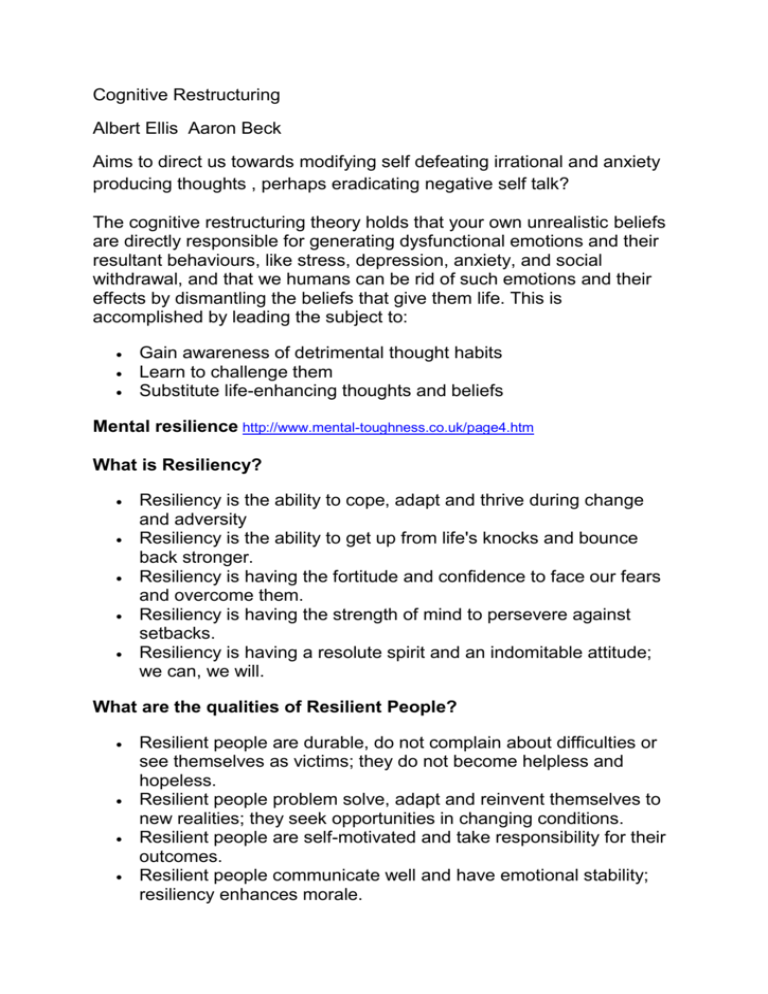
Cognitive Restructuring Albert Ellis Aaron Beck Aims to direct us towards modifying self defeating irrational and anxiety producing thoughts , perhaps eradicating negative self talk? The cognitive restructuring theory holds that your own unrealistic beliefs are directly responsible for generating dysfunctional emotions and their resultant behaviours, like stress, depression, anxiety, and social withdrawal, and that we humans can be rid of such emotions and their effects by dismantling the beliefs that give them life. This is accomplished by leading the subject to: Gain awareness of detrimental thought habits Learn to challenge them Substitute life-enhancing thoughts and beliefs Mental resilience http://www.mental-toughness.co.uk/page4.htm What is Resiliency? Resiliency is the ability to cope, adapt and thrive during change and adversity Resiliency is the ability to get up from life's knocks and bounce back stronger. Resiliency is having the fortitude and confidence to face our fears and overcome them. Resiliency is having the strength of mind to persevere against setbacks. Resiliency is having a resolute spirit and an indomitable attitude; we can, we will. What are the qualities of Resilient People? Resilient people are durable, do not complain about difficulties or see themselves as victims; they do not become helpless and hopeless. Resilient people problem solve, adapt and reinvent themselves to new realities; they seek opportunities in changing conditions. Resilient people are self-motivated and take responsibility for their outcomes. Resilient people communicate well and have emotional stability; resiliency enhances morale. Resilient people see change as challenge and have commitment, control and confidence. Life is full of uncertainties, stresses, demands and pressures, but rather than avoid these challenges, we can develop the attitudes, behaviours and mindsets to be resilient and mentally tough. We can work to close the gap between the demands and our coping ability. Being resilient, means that we are willing to accept that life is full of uncertainties and we have more confidence in dealing with adverse events and changes. Being resilient means that we will persist and persevere in the face of adversity. The future belongs to the fearless, resilient and mentally tough. How do we make the shift to Personal Resilience? http://www.refresher.com/mindfulnetwork/articlelive/articles/145/1/Person al-Resilience-Sustainable-Self-Esteem/Page1.html By: 1. Focusing on our similarities to others rather than our differences. 2. Encouraging others, exploring possibilities with them and valuing their talents and opinions. 3. Trusting our own judgement and intuition. 4. Taking responsibility for ourselves and behaving authentically. 5. Slowing down our decision making and pausing to reflect on our intention. Resiliency and self-esteem and self efficacy http://www.embracethefuture.org.au/resiliency/index.htm?http://www.embracethefuture.org.au/resiliency/self_esteem. htm Self-esteem refers to a person's subjective evaluation of their own worth: put simply, it is how good a person feels about him or herself. Resiliency is not based on a high self-esteem that is disconnected from one's behaviour and achievements. Whilst resilient people view themselves as lovable and worthy of respect and care, this self-esteem is grounded in values of respect for others, a desire to contribute, and experiences of mastery and competence. Rather than viewing self-esteem as a necessary precondition for success, researchers are increasingly viewing it as the natural outcome of experiences of competence and contribution. By achieving important goals, and through being involved in meaningful contribution to their family, school and community, children develop a healthy sense of competence and selfregard. (Andrew’s comment Therefore arguably the more goals we set and achieve then the more resilience we develop. The more we achieve , the more we CAN achieve.). We do achieve The concept of self-efficacy is closely related to self-esteem, but whereas self-esteem refers to a global evaluation of the self, selfefficacy refers to a belief in one's ability to effect a specific outcome. Self-efficacy is domain-specific. That is to say, a person may possess self-efficacy in one area (for example, the ability to make new friends), but not in another (e.g., the ability to fix a broken fence). Tips to improve your resilience http://www.cnn.com/HEALTH/library/resilience/MH00078.html Working on your mental well-being is just as important as working on your physical health. If you want to strengthen your resilience, try these tips: Get connected. Build strong, positive relationships with family and friends, who provide support and acceptance. Volunteer, get involved in your community, or join a faith or spiritual community. Find meaning. Develop a sense of purpose for your life. Having something meaningful to focus on can help you share emotions, feel gratitude and experience an enhanced sense of well-being. Start laughing. Finding humor in stressful situations doesn't mean you're in denial. Humor is a helpful coping mechanism. If you can't find any humor in a situation, turn to other sources for a laugh, such as a funny book or movie. Learn from experience. Think back on how you've coped with hardships in the past. Build on skills and strategies that helped you through the rough times, and don't repeat those that didn't help. Remain hopeful. You can't change what's happened in the past, but you can always look toward the future. Find something in each day that signals a change for the better. Expect good results. Take care of yourself. Tend to your own needs and feelings, both physically and emotionally. This includes participating in activities and hobbies you enjoy, exercising regularly, getting plenty of sleep and eating well. Keep a journal. Write about your experiences, thoughts and feelings. Journaling can help you experience strong emotions you may otherwise be afraid to unleash. It also can help you see situations in a new way and help you identify patterns in your behavior and reactions. Accept and anticipate change. Expecting changes to occur makes it easier to adapt to them, tolerate them and even welcome them. With practice, you can learn to be more flexible and not view change with as much anxiety. Work toward a goal. Do something every day that gives you a sense of accomplishment. Even small, everyday goals are important. Having goals helps you look toward the future. Take action. Don't just wish your problems would go away or try to ignore them. Instead, figure out what needs to be done, make a plan and take action. Maintain perspective. Look at your situation in the larger context of your own life and of the world. Keep a long-term perspective and know that your situation can improve if you actively work at it. Practice stress management and relaxation techniques. Restore an inner sense of peace and calm by practicing such stress-management and relaxation techniques as yoga, meditation, deep breathing, visualization, imagery, prayer or muscle relaxation. Expect good results! Do something you enjoy every single day of your life!
